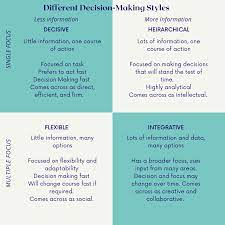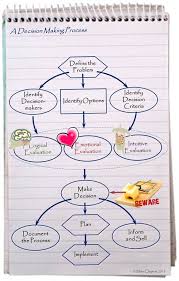Examples of Intuitive Decision Making
Intuitive decision making is the process of making choices based on instinct, gut feeling, or unconscious knowledge. It relies on quick, automatic judgments rather than a rational analysis of the situation. Here are some examples of intuitive decision making:
- Choosing a Career Path: Sometimes, individuals make career decisions based on their intuition rather than a detailed analysis of pros and cons. They may feel drawn to a particular field or profession without fully understanding why.
- Selecting a Life Partner: Many people rely on their intuition when choosing a life partner. They may feel a strong connection with someone without being able to explain it logically.
- Making Creative Choices: Artists, writers, and musicians often rely on intuition when creating their work. They trust their instincts to guide them in making creative choices.
- Social Interactions: Intuition plays a role in social interactions as well. People may quickly judge others’ intentions or emotions based on subtle cues and make decisions accordingly.
- Sports Performance: Athletes often make split-second decisions during games based on intuition and previous experience rather than conscious thought.
Intuitive decision making can be a valuable tool in situations where quick judgments are necessary or when there is limited information available. While it may not always lead to the most rational choice, intuition can provide valuable insights and guide individuals towards decisions that align with their values and beliefs.
7 Tips for Mastering Intuitive Decision Making
- Trust your instincts
- Stay open-minded
- Consider past experiences
- Listen to your emotions
- Take a step back and reflect
- Simplify complex situations
- Seek feedback from others
Trust your instincts
Trusting your instincts is a key aspect of intuitive decision making. Our instincts are often based on our past experiences, emotions, and subconscious knowledge, guiding us towards choices that feel right on a gut level. When faced with a decision, it’s important to listen to your inner voice and trust the feelings that arise. While rational analysis has its place, sometimes our instincts can provide valuable insights that lead us in the right direction. By acknowledging and honoring our intuition, we can make decisions that resonate with our true selves and align with our deepest desires and values.
Stay open-minded
Staying open-minded is a crucial tip when it comes to examples of intuitive decision making. By keeping an open mind, individuals can embrace new ideas, perspectives, and possibilities that may not align with their initial thoughts. This openness allows for a broader range of information to influence intuitive judgments, leading to more creative and innovative decisions. Being receptive to different viewpoints can also help in challenging assumptions and biases, ultimately enhancing the quality of intuitive decision making processes.
Consider past experiences
When utilizing intuitive decision making, it is beneficial to consider past experiences as a valuable source of information. Reflecting on previous situations where intuition played a role can provide insights into patterns, outcomes, and personal preferences. By acknowledging how past decisions have influenced current circumstances, individuals can leverage their intuition more effectively in similar scenarios. Drawing upon past experiences can enhance one’s ability to trust their instincts and make confident decisions based on a combination of intuition and learned wisdom.
Listen to your emotions
Listening to your emotions is a key aspect of intuitive decision making. Emotions can provide valuable insights into how we truly feel about a situation, guiding us towards choices that align with our values and desires. By paying attention to our emotional reactions, whether it’s a sense of excitement or unease, we can tap into our intuition and make decisions that resonate with our inner selves. Trusting our emotions can lead to more authentic and fulfilling outcomes in various aspects of life, from relationships to career choices.
Take a step back and reflect
When it comes to examples of intuitive decision making, one valuable tip is to take a step back and reflect. By pausing and giving yourself the opportunity to reflect on a decision, you allow your intuition to surface and guide you towards a choice that aligns with your inner feelings and values. This practice can help you tap into your subconscious knowledge and instincts, leading to more authentic and meaningful decisions in various aspects of life.
Simplify complex situations
When it comes to intuitive decision making, one effective tip is to simplify complex situations. By breaking down intricate scenarios into more manageable components, individuals can tap into their instincts and make quicker, more confident decisions. Simplifying complex situations allows for a clearer focus on essential factors, enabling intuition to guide the decision-making process effectively. This approach helps in reducing overwhelm and uncertainty, leading to more decisive and intuitive choices that align with one’s inner knowing.
Seek feedback from others
Seeking feedback from others is a valuable tip when it comes to intuitive decision making. By consulting with trusted individuals, you can gain different perspectives and insights that may not have been apparent to you initially. Feedback from others can help validate your intuitive feelings or provide alternative viewpoints that could lead to a more well-rounded decision. It allows you to consider factors that you might have overlooked and helps ensure that your intuition is aligned with reality. Ultimately, seeking feedback from others can enhance the quality of your intuitive decision-making process.




